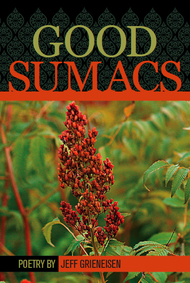
As I look back on my writing life, I have noticed that many writers, especially poets, seem to drift in and out of my life. I live in a secluded area, especially when it comes to the literary world, so I have found it rather easy to lose touch with many writers I have met. Yet, social media has made it easier to "find" these writers again. Indeed, a link from a Facebook page led me to discover Good Sumacs by Jeff Grieneisen.
Place rules the poems found in Good Sumacs, as the book meanders between the poet's home state of Pennsylvania and his current home in Florida. Many of the poems found in the first part of the collection tell stories of family, such as seen in "My Grandmother" where the narrator pictures a woman "widowed young" walking through the streets of Brockway (where incidentally is only 30 minutes away from my hometown), "to the glass factory/where she machined gobs of soda ash/into smooth, cool jars." In other poems, the narrator himself becomes a character as found in "Like a Butterfly" where he and his sister "rubbed powder off delicate/transparent wings" of butterflies so they could pretend they were pixies, or in the quieter, more meditative poem, "Transforming" where he shakes apples trees so the fruit falls to the ground, fruit that will later be a meal for the local wildlife: "At dusk, three doe carefully munch apples/snuff breath into the air/with black, glossy noses."
In other poems, place becomes the main character. In "At the William Penn Museum," the narrator tells about his first adventure on an escalator while in "Echoes" he narrates his descent into the caverns of the Susquehannocks. My favorite poem, however, is "Centralia" where the poet looks at a Pennsylvania coal town deserted because of a raging mine fire underneath the ground. With careful attention to detail, Grieneisen pictures the town today: "Smoke still creeps/from the dusty cracked ground/buckling highways, swallowing homes/and melting the rubber soles of sneakers/on Ashland teenagers who sneak/into Centralia woods with stolen beer kegs."
The tone of this collection shifts a bit when Grieneisen's poems move towards Florida. Indeed, the poem, "Writing Nothing about Florida" can only be described as a work about homesickness: "Here the dirt is sand/and lakes teem with Anhingas/that do not sing/like chickadees or cardinals/but cry like feathered beasts/breaking the darkness/that hides nothing." Other poems find the narrator slowly maneuvering around what he would deem as a foreign landscape. For instance, in "Tropicana" he describes a city that smells like "the burning carcasses of oranges." In another poem, "Dance of the Anoles," he chronicles the "invisible love" of creatures who "spin, face to face/tails a compass needle never finding home."
Jeff and I went to graduate school together many years ago (more years than I care to admit!) and have since lost touch, which is why I'm so happy to discover his debut collection of poetry. I'm especially thrilled to see his navigation of place, and the connections between characters and setting, connections I strive so hard to make in my own work.
More information about Good Sumacs can be found at Mammoth Books, the publisher, and on the poet's website.
Place rules the poems found in Good Sumacs, as the book meanders between the poet's home state of Pennsylvania and his current home in Florida. Many of the poems found in the first part of the collection tell stories of family, such as seen in "My Grandmother" where the narrator pictures a woman "widowed young" walking through the streets of Brockway (where incidentally is only 30 minutes away from my hometown), "to the glass factory/where she machined gobs of soda ash/into smooth, cool jars." In other poems, the narrator himself becomes a character as found in "Like a Butterfly" where he and his sister "rubbed powder off delicate/transparent wings" of butterflies so they could pretend they were pixies, or in the quieter, more meditative poem, "Transforming" where he shakes apples trees so the fruit falls to the ground, fruit that will later be a meal for the local wildlife: "At dusk, three doe carefully munch apples/snuff breath into the air/with black, glossy noses."
In other poems, place becomes the main character. In "At the William Penn Museum," the narrator tells about his first adventure on an escalator while in "Echoes" he narrates his descent into the caverns of the Susquehannocks. My favorite poem, however, is "Centralia" where the poet looks at a Pennsylvania coal town deserted because of a raging mine fire underneath the ground. With careful attention to detail, Grieneisen pictures the town today: "Smoke still creeps/from the dusty cracked ground/buckling highways, swallowing homes/and melting the rubber soles of sneakers/on Ashland teenagers who sneak/into Centralia woods with stolen beer kegs."
The tone of this collection shifts a bit when Grieneisen's poems move towards Florida. Indeed, the poem, "Writing Nothing about Florida" can only be described as a work about homesickness: "Here the dirt is sand/and lakes teem with Anhingas/that do not sing/like chickadees or cardinals/but cry like feathered beasts/breaking the darkness/that hides nothing." Other poems find the narrator slowly maneuvering around what he would deem as a foreign landscape. For instance, in "Tropicana" he describes a city that smells like "the burning carcasses of oranges." In another poem, "Dance of the Anoles," he chronicles the "invisible love" of creatures who "spin, face to face/tails a compass needle never finding home."
Jeff and I went to graduate school together many years ago (more years than I care to admit!) and have since lost touch, which is why I'm so happy to discover his debut collection of poetry. I'm especially thrilled to see his navigation of place, and the connections between characters and setting, connections I strive so hard to make in my own work.
More information about Good Sumacs can be found at Mammoth Books, the publisher, and on the poet's website.
 RSS Feed
RSS Feed
